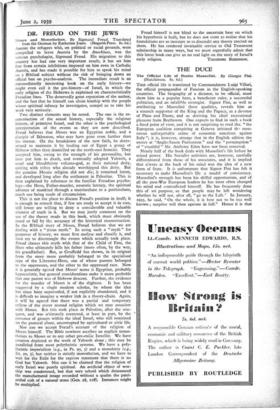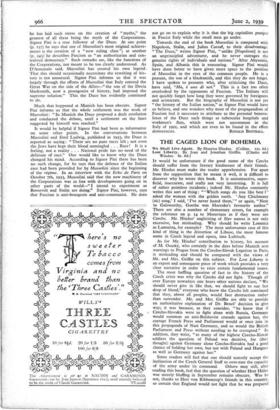THE DUCE
Tills official life is translated by Commendatore Luigi
the official propagandist of Fascism in the English-speaking countries. The biography of a dictator, to be official, must show him as a popular hero, a beneficent ruler, a successful politician, and an infallible strategist. Signor Pini, as well as attributing to Mussolini these qualities, reveals him as a staunch supporter of the King and the Papacy, as a devotee of Plato and Dante, and as deriving his chief recreational pleasure from Beethoven. One expects to find in such a book a fixed point of view, and it is not surprising to read tha... " the European coalition conspiring at Geneva initiated th • mon- strous unforgettable crime of economic sanctions against Italy "; it is, however, strange that in the English edition the sneers at "Anglo-Saxon Puritanism " and the " presumption " of " youthful " Mr. Anthony Eden have not been removed.
Nearly half of the book deals with Mussolini's life before he seized power. His Socialist activities are, however, carefully differentiated from those of his associates, and it is implied that always at the back of his mind was the idea of a new form of State. It is unfortunate that Signor Pini has felt it necessary to make Mussolini's life a model of consistency. Mussolini's strength has been his skilful opportunism, and of all the post-War European leaders he has most often changed his mind and contradicted himself. He has frequently done this of set purpose, so that people may be left wondering whether he will not, after all, " go to the Left. ' In January, 1935, he said, " On the whole, it is best not to be to well known ; surprise will then operate in full." Hence it is that he has laid such stress on the creation of " myths," the greatest of all these being the myth of the Corporations. Signor Pini is a true follower of the Duce. At one point (p. 157) he says that one of Mussolini's most original achieve- ments is the creation of a " new ruling class "; at another (p. 243) he describes Fascism as " an authoritarian and cen- tralised democracy." Such remarks are, like the functions of the Corporations, not meant to be too clearly understood. As D'Annunzio said, Mussolini has created his own legend. That this should occasionally necessitate the rewriting of his- tory is not unnatural. Signor Pini informs us that it was largely through the efforts of Mussolini that Italy entered the Great War on the side of the Allies—" the son of the Dovia blacksmith, now a protagonist of history, had imposed the supreme solution." This the Duce has evidently continued to do.
Much that happened at Munich has been obscure. Signor Pini informs us that the whole settlement was the work of Mussolini: " In Munich the Duce proposed a draft resolution and conducted the debate, until a settlement on the lines suggested by himself was reached."
It would be helpful if Signor Pini had been as informative on some other points. In the conversations between Mussolini and Emil Ludwig, published in 1933, the Duce is reported as saying: " There are no pure races left ; not even the Jews have kept their blood unmingled . . . Race! It is a feeling, not a reality . . . National pride has no need of the delirium of race." One would like to know why the Duce changed his mind. According to Signor Pini there has been no such change, for he says that the defence of the Italian race had been provided for by Mussolini since the beginning of the regime. In an interview with the Echo de Paris on October 7th, 1933, Mussolini said that the new machinery of the Corporations was in line with developments going on in other parts of the world—" I intend to experiment as Roosevelt and Stalin are doing." Signor Pini, however, says that Fascism is anti-bourgeois and anti-communist. He does
not go on to explain why it is that the big capitalists prosper in Fascist Italy while the small men go under.
Towards the end of the book Mussolini is compared with Napoleon, Stalin, and Julius Caesar, to their disadvantage. " The Duce," writes Signor Pini, " unlike [Napoleon] is not an unprincipled adventurer, and he never outrages the genuine rights of individuals and nations." After Abyssinia, Spain, and Albania this is reassuring. Signor Pini would have done better to have given more space to the position of Mussolini in the eyes of the common people. He is a peasant, the son of a blacksmith, and this they do not forget. I have spoken to peasants who, after criticising the Duce, have said, "Ma, e uno di noi." This is a fact too often overlooked by the opponents of Fascism. The Italians will not quickly forget how long they were governed by foreigners and aristocrats. But the biography of Mussolini is not yet "the history of the Italian nation," as Signor Pini would have us believe, and one wonders why most of the propagandists of Fascism feel it necessary to attribute to the personal benevo- lence of the Duce such things as tubercular hospitals and workmen's flats, which were not uncommon in the Italy of 1921, and which are even to be found in the effete











































 Previous page
Previous page